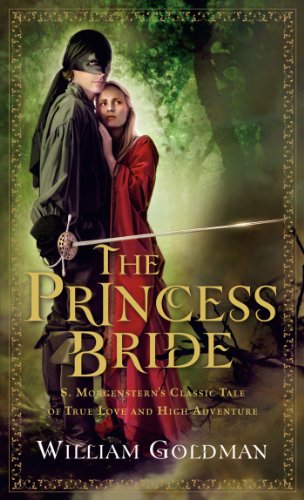
Look, (Grownups skip this paragraph.) I’m not about to tell you this book has a tragic ending. I already said in the very first line how it was my favorite in all the world. But there’s a lot of bad stuff coming up, torture you’ve already been prepared for, but there’s worse. There’s death coming up, and you better understand this: some of the wrong people die…. and the reason is this; life is not fair. Forget the garbage your parents put out. Remember Morgenstern. You’ll be a lot happier.
Last night I watched the film, “The Princess Bride” for the umpty-third time. Laughed and cried.
What’s not to love? It’s the perfect confection, almost parody but not quite. Self-aware, over the top, but entirely without condescension. Everybody involved seems to be having fun, and they welcome the viewer into the fun.
I first saw the movie in its first theatrical run. It got good reviews at the time, but wasn’t a major hit. Only when home video became available did it find its audience. Now it’s one of the most beloved – and quotable – movies in the world. With good reason.
But before I was a fan of the movie, I was a fan of the book. It was published in 1973, and I must have picked it up around 1978. Frankly, I bought it out of base motives – the original cover blurb called it “A Hot Fairy Tale!” I found something way better than I expected.
The big difference between the book and the movie is what I guess you’d call the “metanarrative.” In the movie you having a charming, funny adventure story, framed by a sweet series of vignettes involving a grandfather and his grandson.
The frame of the book is much broader and more complex. Goldman fictionalizes his own life, claiming his father was an immigrant from Florin, one of the imagined kingdoms in the book. He presents himself as a screenwriter who’s gone full Hollywood. He’s lost touch with his son (in real life Goldman had two daughters). Out of guilt, he tries to connect with the boy by giving him the book his dad used to read to him, The Princess Bride, by S. Morgenstern. Only he discovers that the book isn’t what he thought – most of it is a long, dull satire on the politics of Florin and Guilder at the time of the book’s writing. The real adventure stuff was just a minor narrative threaded here and there through the text. His dad had only read him the “good parts.” So Goldman has decided (he claims) to produce a “good parts” version of The Princess Bride.
But he can’t resist adding his own commentary, in pretty large doses, in footnotes and parenthetical interpolations. He talks about his childhood, his dreams, his disappointments. The movies he loves. The movies he wrote, and what he was trying to accomplish with them. How his life has consistently fallen short of the aspirations that romantic books and movies arouse in him. The book ends differently from the movie. The movie’s ending is sweet and heartwarming. The end of the book is ambivalent. They lived happily after…. But.
What The Princess Bride (novel) is about is the tragedy of impossible yearning. Most of us respond to the great stories. Our hearts are moved by the happy ending, the eucatastrophe, the fulfillment of True Love.
But we live (and who would know this better than a Jewish author?) in a world where True Love doesn’t guarantee that your beloved won’t be killed by a mugger or a pogrom or a stray meteorite. There’s something in our hearts that tells us True Love has to conquer all. Yet all around us we see that it doesn’t.
I have no idea what William Goldman’s spiritual beliefs were, if any. If he’d asked, someone could have told him about a True Love that does guarantee a miracle resurrection.

I want to say I watched it in theaters, but I don’t remember. It’s possible. It’s so much fun.